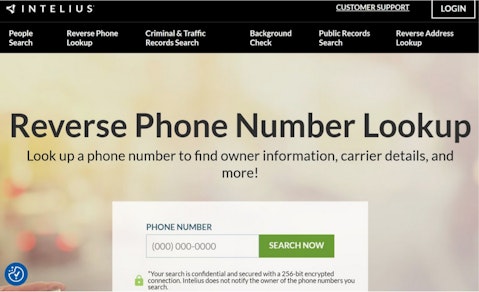
Dean Drobot/Shutterstock.com
Market volatility may seem like the biggest problem for investors today, but it is not the only one. According to the Federal Trade Commission, reported losses from investment fraud have increased significantly, reaching $5.7 billion in 2024.
Texts and phone calls were among the most common methods of contact used by scammers. The good news is that you can prevent this with a quick reverse phone lookup.
For hedge fund managers, angel investors, and individual traders alike, it isn’t just smart — it’s essential. Let’s see how to use free reverse phone lookup and premium tools always to be certain who you are dealing with before investing.

The Growing Threat of Phone-Based Financial Scams
The financial sector is a prime target for fraudsters. It is a place where people have money and want to make more, so scammers use this as a trigger.
Scams often begin with a simple phone call or text, whether it’s a fake stock tip, a phishing attempt disguised as a trading platform alert, or someone impersonating an SEC representative.
Take a major scam based in Tbilisi, Georgia, that defrauded UK investors of over £9 million (around $12 million). Victims were drawn in by fake online ads and then contacted by phone by scammers posing as investment advisors. One 69-year-old man was told he was a millionaire, only to lose £162,000 ($215,000) to a bogus cryptocurrency scheme. What seemed like a golden opportunity turned out to be a heartbreaking con.
Many scammers now employ spoofing techniques to conceal their identities, making it appear they are calling from legitimate numbers to establish credibility. This is a case when reverse phone lookup technology helps.
What Is Reverse Phone Lookup & How to Use It
Reverse phone lookup enables users to input a phone number and instantly retrieve available information, including carrier details, spam score, location, and the owner’s data. This tool serves as a potential line of defense for investors when they receive tempting offers from unknown callers.
Imagine being approached with a “too good to be true” investment opportunity over the phone. Before proceeding, savvy investors verify the legitimacy of the offer and the person behind it.
It is an immediate insight into a mysterious caller. Whether you’re receiving pitches for “pre-IPO opportunities” or sudden tax-related threats, a quick lookup can reveal whether the caller’s information is relevant to what they say.
Moreover, you can investigate the caller in more detail. Reputable people search services, such as Intelius and TruthFinder, utilize reverse phone number lookups to reveal background information on the caller, including related numbers and individuals. These tools require a small fee, but it is a thousand or a million times less than the amount you risk losing when encountering a fraudster.

This method is also particularly useful in mergers and acquisitions, private placements, or crypto-related investments, where the risk of fraud is notably high. When combined with other verification tools, such as LinkedIn cross-checks or domain reputation tools, reverse phone lookups form a comprehensive due diligence workflow.
Practical Integration into Your Risk Management Strategy
Once again, reverse phone lookup is a good checkpoint, but it should not be your only tool. Why? Remember the famous case in 2022, when the UK’s Metropolitan Police led Operation iSpoof, targeting a website that enabled criminals to make unauthorized phone calls displaying caller IDs of legitimate organizations. Therefore, when obtaining information from a reverse phone lookup tool, verify it further.
Every layer of protection counts for those managing significant assets or overseeing fund portfolios. We recommend integrating reverse phone lookup into your standard risk mitigation protocol:
- Vet unsolicited investment proposals.
- Check inbound communication from unfamiliar brokers.
- Verify contact info from cold outreach by supposed financial journalists or influencers.
Reverse phone lookups can complement tools like email verifiers, VPNs, and multifactor authentication as part of your digital hygiene practices. Base your next investment decision on proven data, not deception and tempting offers.
If you want to contribute more security-first strategies to your investment approach, stay informed through regulatory bodies like the SEC’s Office of Investor Education and FINRA’s Scam Awareness.





